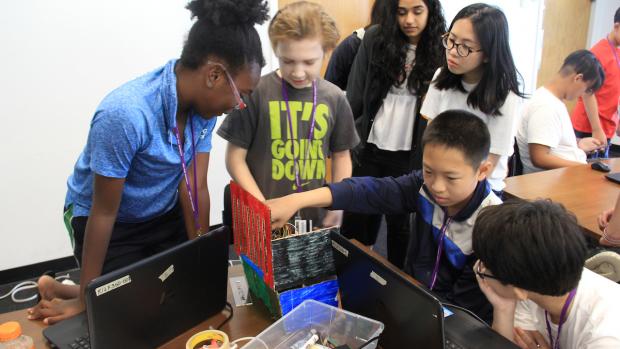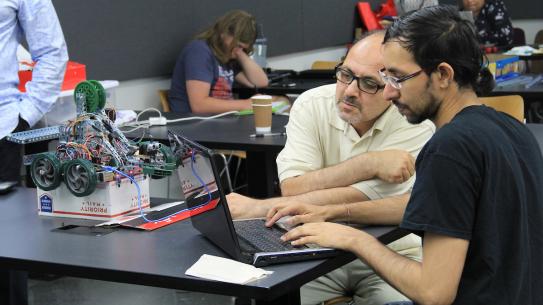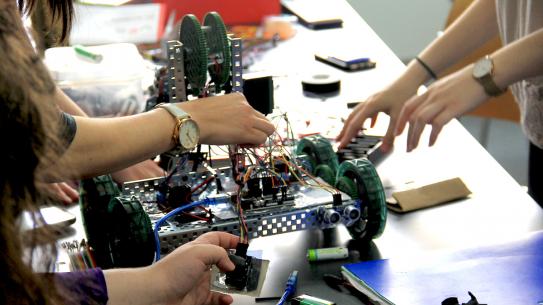#STEMnow heats up the summer for hundreds of NYC students and teachers
#STEMnow at NYU Tandon brings teachers and students from diverse backgrounds to Brooklyn for cutting-edge research and exploration of AI, cybersecurity, smart cities, wireless, and more

BROOKLYN, New York, Tuesday, July 9, 2019 – Hundreds of New York City students and teachers from diverse backgrounds and all five boroughs and beyond are gathering in Downtown Brooklyn for NYU Tandon School of Engineering’s seventh summer #STEMnow initiative, one of the largest and most comprehensive university-based programs of free summer workshops, classes, and labs.
This year the teachers and young students will explore the exciting fields for which NYU Tandon is known: cybersecurity, wireless technologies, smart cities, robotics, and artificial intelligence (AI). Altogether, more than two dozen summer programs will cover these topics and more, bringing high school students into laboratories for advanced research while engaging students and teachers – many from less financially advantaged communities — in hands-on learning.
#STEMnow will give some 500 middle and high school students — from a record 2,000 applicants citywide — and more than 80 teachers opportunities to tackle real-world problems while learning in-demand STEM skills. At least 140 NYU faculty members (including a quarter of all NYU Tandon tenure and tenure-track faculty), doctoral candidates, post-doctoral researchers, and graduate and undergraduate students will participate as teachers and mentors, demonstrating that NYU Tandon’s commitment to the community is not merely an extracurricular activity, but a central strategic pillar.
#STEMnow, with the support of the National Science Foundation (NSF), vastly increases its effectiveness by teaching not just students, but middle and high-school teachers. Eight programs are funded by NSF grants that provide stipends allowing #STEMnow to attract outstanding high school teachers, each of whom will pass along their newly acquired knowledge to hundreds or even thousands of students during their careers.
"The Center for K12 STEM Education is pleased to welcome hundreds of young students and teachers to the Tandon School of Engineering campus again this summer,” said Ben Esner, director of the Center for K12 STEM Education at NYU Tandon. “Our programs serve more people every year, and we are grateful for the outstanding commitment of faculty, undergraduate and graduate students to provide a high quality educational experience, and to the support of corporate, foundation and philanthropic partners.”

A recent study by the New York Equity Coalition reported that underserved schools lack sufficient STEM gateway courses and opportunities. For the past six years, #STEMnow, under NYU Tandon’s Center for K12 STEM Education, has worked to change that. Highlights of this seventh summer include:
#STEMnow helps solve NYC’s greatest sustainability and livability challenges
SONYC (Sounds of New York City) – mitigating noise pollution, the No. 1 complaint of New Yorkers
- Middle school students will learn the science of sound as part of this city-funded project involving nearly two dozen researchers and scientists at NYU Tandon and NYU Steinhardt School of Culture, Education, and Human Development. Participants will conduct field and lab work, including “sound walks” in Brooklyn’s DUMBO neighborhood to record ambient noises and analyze them in the audio lab of Luke Dubois, a professor and co-director of NYU Tandon’s Integrated and Digital Media program.
- Middle school teachers will get two weeks of professional training in the technologies behind SONYC, followed by two weeks of classroom work alongside the students.
- Teachers and students work together to complete an intensive curriculum developed by the Music, Audio, and Research Laboratory at NYU Steinhardt.
COSMOS
This immersion in cutting-edge wireless technology gives middle and high school teachers a unique opportunity to become part of the Cloud Enhanced Open Software Defined Mobile Wireless Testbed for City-Scale Deployment (COSMOS), one of the first and largest testbeds for 5G and advanced wireless communications in the country. This summer, with the support of NSF funding, 10 New York teachers arrive at NYU Tandon and Columbia Engineering to design and develop web-based curricula and experiments that they will take back to their classrooms in the fall. Students will learn basic electrical engineering principles, such as the physics of radio waves, then test their knowledge with hands-on experiments such as weather monitoring and smart transportation sensors. Through the support of AT&T, master’s students will give classroom support this fall via mentoring and technical expertise.
C2SMART
As part of the seven-week ARISE (Applied Research Innovations in Science and Engineering) program, in which 62 high-school students do authentic research in 31 NYU labs, a cohort of students will explore transportation systems and urban mobility at NYU Tandon’s C2SMART, a U.S. Department of Transportation–funded Tier 1 University Transportation Center. The high schoolers, working with Ph.D. students, will learn new computer programs, including transportation-specific software, and how to deploy such technologies as commercial drones while participating on active research projects including: development of a bicycle sensor to study cycling safety; urban parking research; a study of how wearable sensors can improve safety in work zones; and research on how anonymous data from devices, satellite imagery, and social media can predict population-level public health problems.
NYU WIRELESS
Another ARISE program gives students an opportunity to help develop the next generation of Internet technologies in Professor Shivendra Panwar’s laboratory at NYU WIRELESS, an international leader in research of advanced wireless communication.
Smart Cities
A five-week intensive program for middle school students, Science of Smart Cities (SoSC) will explore energy delivery and the grid, urban infrastructure, transportation and wireless communications, and more, all focused on making cities livable, efficient, sustainable, and safer.
For high school students, Innovation and Entrepreneurship and the Science of Smart Cities (ieSoSC) gives participants, many of whom completed SoSC, a taste of the fast-paced, high-stakes world of smart-city technology startups through hands-on projects, instruction, and activities that apply coding/computer science, engineering, and technology skills.
- Students participating in SoSC and ieSoSC will demonstrate their projects during a Smart Cities Day at NYU Tandon, open to the public, on Friday August 2, 2019.
#STEMnow teaches cybersecurity and AI
Cybersecurity and AI are fields projected to grow at a blistering pace over the next few years. NYU Tandon brings its reputation, expertise, and influence in both to bear on its STEM courses for NYC high schoolers.
- CS4CS (Computer Science for Cybersecurity) is a three-week full-day program that introduces a diverse group of high schoolers (80% of whom are young women) to programming, virtuous hacking, and digital forensics during an intensive and supportive three-week program designed to encourage them to pursue educational opportunities in cybersecurity.
- High school is not too early to dip a toe into artificial intelligence. One ARISE opportunity gives intrepid scholars an introduction to machine learning with artificial intelligence researcher Professor Anna Choromanska.
#STEMnow brings robotics, mechatronics, and electrical engineering to NYC classrooms
For the past six years, #STEMnow robotics and mechatronics programs have enhanced science and math curricula in dozens of middle and high schools across New York City through NSF-funded programs. This year, these innovative workshops include:
- CrEST (Creativity in Engineering, Science, and Technology): This summer, a group of high school students who this spring learned circuitry, electronics, mechanical systems, physical computing, robotics and other STEM disciplines from NYU engineering students, are putting their skills to the test. They will run week-long workshops for middle school students from partner nonprofit organization’s summer programs and from the NYC community. Workshops follow fun themes such as Arduino and TinkerCAD, the Internet of things, and 3D printing and basic electronics.
- Discovery Research for Teachers: NYU Tandon experts help teachers take robotics to their middle school science and math classrooms. This comprehensive, year-round STEM professional development program includes intensive two-day sessions this summer on using robotics to support math and science curricula and in-classroom support by NYU Tandon graduate students during the school year. This summer, for the first time, three teachers who previously completed the program will return to teach a two-day curriculum they developed using LEGO EV3 robots.
- ITEST Robotics and Entrepreneurship: Robotics and engineering drive professional development for high school teachers and educational enrichment for their students. Teachers, each joined by two of their students, will learn about business planning, new-product development, intellectual property, and fundraising. Included are Shark Tank-style pitching competitions for students and kits of robotics equipment for teachers to use back at their schools.
- SMARTeR (Science and Mechatronics-Aided Research for Teachers with an Entrepreneurship Experience): This program gives teachers, almost all from public schools, a chance to enhance their STEM curricula with a hands-on exploration of mechanical engineering, control theory, computer science, and electronics. Participants also learn such entrepreneurship skills as new-product development, intellectual property, and fundraising. Teachers conduct engineering research alongside graduate and undergraduate researchers and faculty.

Why STEM matters at NYU Tandon
A 2018 study by the Pew Research Center reported that STEM employment has grown 79% since 1990, and computer jobs saw a 338% increase over the same period.
But diversity in STEM professions is not keeping pace: African Americans represent just 9% of STEM workers, and Hispanics just 7%. But 85% percent of students who are ultimately served by #STEMnow — thanks in part to teachers who participate in its teacher training programs — come from communities historically underrepresented in STEM disciplines.
Women constitute only 13% of the engineering workforce, a quarter of computer science occupations, and only 11% of global cybersecurity positions; but young women constitute half of this year’s #STEMnow participants, a reflection of NYU Tandon’s efforts to decrease gender disparity among undergraduate engineers. Over the last decade, NYU Tandon has more than quadrupled the percentage of women entering its freshman class, and the most recent cohort of women represent more than double the national undergraduate average.
#STEMnow receives generous support from the ADB Foundation for Human Advancement, AT&T, Con Edison, DTCC, ExpandED Schools, the Lily Auchincloss Foundation, National Grid, NSF, Northrop Grumman, the OATH Foundation, The Pinkerton Foundation, the Richard Lounsbery Foundation, and the Siegel Family Endowment.
For more information on #STEMnow, visit engineering.nyu.edu/k12stem. For information on summer courses, visit engineering.nyu.edu/highschoolsummer. To register for Tech Kids Unlimited, visit www.techkidsunlimited.org/register. Join the conversation at #STEMnow.
Note: Images available at https://nyutandon.photoshelter.com/galleries/C0000HpiIMWgv05o/G0000QuQkj.jRYEQ/STEMnow-2018
About the New York University Tandon School of Engineering
The NYU Tandon School of Engineering dates to 1854, the founding date for both the New York University School of Civil Engineering and Architecture and the Brooklyn Collegiate and Polytechnic Institute (widely known as Brooklyn Poly). A January 2014 merger created a comprehensive school of education and research in engineering and applied sciences, rooted in a tradition of invention and entrepreneurship and dedicated to furthering technology in service to society. In addition to its main location in Brooklyn, NYU Tandon collaborates with other schools within NYU, one of the country’s foremost private research universities, and is closely connected to engineering programs at NYU Abu Dhabi and NYU Shanghai. It operates Future Labs focused on start-up businesses in downtown Manhattan and Brooklyn and an award-winning online graduate program. For more information, visit http://engineering.nyu.edu.




